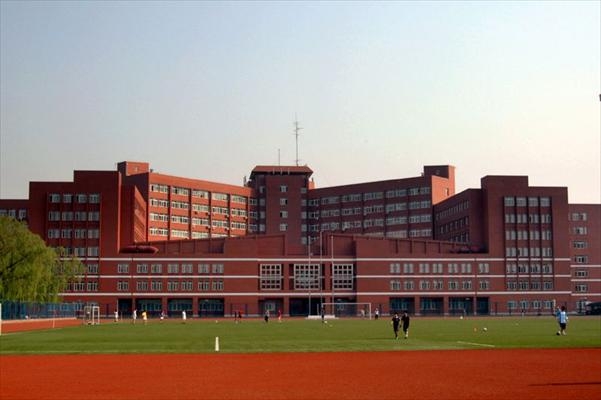



One of China's first few institutions that offered undergraduate education in foreign language. Is the key base in China on the teaching and research of foreign languages, translation, tourism, and economics and foreign trade.
Beijing International Studies University (BISU) is a renowned institution of higher education of multi-disciplines, offering subjects and courses of literature, management, economics, and law, with the foreign languages and literature as its dominant discipline and tourism management as its specialized discipline. It is an important base in China for the teaching and research of foreign languages, translation, tourism, and economics and foreign trade.
BISU was founded in 1964 with the support of China’s late premier Zhou Enlai, was one of China's first few institutions that offered undergraduate education in foreign languages. In its history, BISU was once under the successive leaderships of China International Cultural Liaison Commission, the Ministry of Foreign Affairs, the People's Government of Beijing Municipality, Ministry of Education and China National Tourism Administration. Today, BISU is sponsored by the People's Government of Beijing Municipality.
With “Integrity, Diligence, Truth, and Leadership” as its motto, BISU has long dedicated itself to passing down eastern and western civilizations and cultural and educational exchanges between China and other countries. Students are inspired to learn from both civilizations and achieve the unity of knowing and doing, while its exceptional faculty is committed to offering students education in the spirit of humanities education. BISU has accumulated profound academic tradition and distinctive experience in teaching, and had a strong faculty, including a group of recognized professors and famous translators in China.
BISU is located in Chaoyang District, Beijing, with The Central Business District (CBD) on its west and Tongzhou District, the subsidiary administrative center of Beijing, on its east. At present, BISU has nearly 10,000 registered students, including 6,200 undergraduate students, 1,300 graduate students, 700 international students and 1,000 students under a seven-year cultivation program. It is organized into 17 academic units, namely School of English Language, Literature and Culture, School of Japanese Language, Literature and Culture, School of Asian Studies, School of European Languages, Literature and Culture, School of Middle Eastern Studies, School of Interpreting and Translation, School of Tourism and Hospitality, Business School, School of Economics, School of International Relations, School of Chinese Culture and Communication, School of International Education of Chinese Language, School of Marxism Studies, Department of Physical Education, Department of Basic Sciences, BISU Seven-year Comprehensive Training Program, and BISU Institute of Châteauroux. The school library has collections of over 1,170,000 volumes, 200 foreign-language newspapers, and 850 Chinese Newspapers. There are more than 1,080,000 copies of e-books. The library has 42 Chinese databases, 61 foreign language databases and two databases established by itself.
At present, BISU offers 44 undergraduate majors (including 26 Bachelor's programs in modern foreign languages). Five primary disciplines and 28 secondary disciplines have been authorized to confer Master’s degrees. It also offers six professional Master’s degree programs. BISU has a Joint Doctoral Program in translation with Binghamton University-the State University of New York, a Joint Doctoral Program in tourism management with University of South Carolina, Columbia, and two post-doctoral research stations (co-founded with Social Sciences Academic Press and with Capital University of Economics and Business). It has one municipal first-rate major (Translation) and four municipal key disciplines (Foreign Language and Literature, Tourism Management, Business Management, International Trade) of Beijing, four national characteristic majors (Japanese, Arabic Language, English, Tourism Management), and one pilot reform major of Ministry of Education (Japanese).
To serve the country and Beijing through building up new-type think tanks, the University aims to achieve excellence in research and ensure that its research contributes to the well-being of society. BISU is home to 13 research institutions, namely China Institute of Culture and Tourism Industry, China Academy for Tourism Talent Development, Big Data Institute of Culture and Tourism Research, China Academy of Belt and Road Initiative, Beijing Institute of Culture and Tourism Development, Beijing Institute of Intercultural Communication, China-Arab States Research Center on Reform and Development, Beijing Institute for International Communication, Institute of Chinese Studies, Institute of Political Education Studies, Laboratory of Artificial Intelligence and Cognitive Science, Digital Resource and Information Service Center, and BISU Academic Journals. A platform of fundamental research has been built through six scientific research bases at the provincial and ministerial level, one collaborative innovation center at the provincial and ministerial level and seven Ministry of Education’s National and Regional Studies Centers. The academic journals include Journal of Beijing International Studies University, Tourism and Hospitality Prospects, Transcultural Studies and Journal of Chinese Economics. In recent years, its research funds have been growing at an annual rate of 30%, and the quality and quantity of research output have been significantly improving.
The school faculty is well-structured in terms of the faculty members’ ages, degrees, specialties and professional titles. The University now has nearly 1,000 full-time teachers, 50% are Ph.D. holders and more than 60% are professors or associate professors. Most of the faculty members had overseas learning experiences or obtained their academic degrees abroad. BISU also employs 120 part-time professors and more than 50 foreign experts. BISU is proud of having two “National Outstanding Teaching Teams”, four “Excellent Teaching Teams of Beijing”, and eight “Innovative Academic Teams of Beijing”